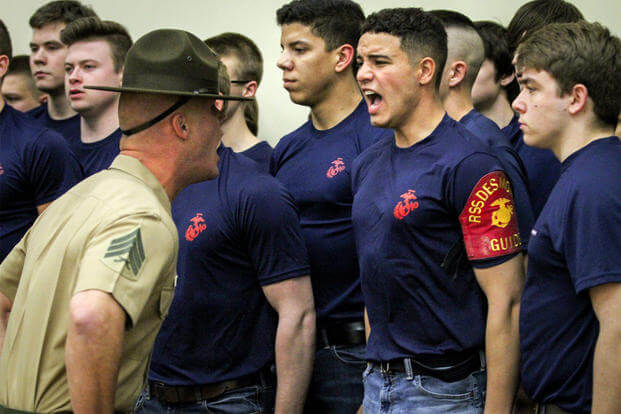Military personnel officials assured lawmakers on Friday that the services are not lowering standards to meet increased recruiting goals as each branch grows larger.
The Army, Navy, Air Force and Marine Corps plan to grow their active-duty ranks as part of their proposed fiscal 2019 budgets. The Navy plans to increase its active-duty force by 7,500 sailors. The Army and Air Force have requested 4,000 additional troops each and the Marine Corps will grow by 1,100 service members.
Rep. Mike Coffman, R-Colorado, chairman of the House Armed Services Committee's personnel subcommittee, said he was "very concerned ... with the lowering of standards."
"When I meet these young men and women who serve in uniform today, they are extraordinary; we truly have talent. We have an elite force," Coffman said at the April 13 hearing.
"I would rather have fewer numbers and high quality than big numbers and low quality," Coffman added, seeking assurances from each service that they would resist the "great temptation" to lower standards just to meet their goals.
Marine Lt. Gen. Michael Rocco, deputy commandant for manpower and reserve affairs, was very confident in the quality of his force, saying that 99 percent of the 31,000 recruits the Marine Corps brought into service this year are at "tier one."
"Of that, only about 70 percent of them will serve past their first tour, and that is based on the personal requirements and based on the needs of the Marine Corps," Rocco said.
Marines that want to continue to serve past their first term must undergo a rigorous screening process, he said.
"We actually have the ability to take those Marines that want to stay in, have boards and only retain the highest quality of those Marines," Rocco said.
"Army leadership has been very clear to me and to recruiting command that it is quality over quantity," Army Lt. Gen. Thomas Seamands, deputy chief of staff for the Army's G-1, said. "We will not sacrifice quality."
But it wasn't always like that, Seamands admitted.
"We went back and looked at the last time we grew, 2008," he said. "We made some mistakes back in 2008, and we are not making them now. Back in 2008, we were focused more on quantity than quality; that is not happening now."
Vice Admiral Robert P. Burke, chief of naval personnel, echoed Seamands' comments.
"We are not going to sacrifice quality," Burke said. "What we have done, though, is taken a good, hard look at self-imposed policies that limit the spectrum of candidates that we look at."
For example, Burke said, Navy recruiting officials are working with the service's medical experts to make sure that the "Navy's side of medical standards are up to date with societal norms."
"We are making sure we are not negatively impacting fleet readiness," he said. "Someone who may have used medication for bronchitis -- does that equate to having asthma, types of things at one point may have been medically disqualifying?"
The Navy has also shifted its recruiting techniques to include virtual tools, Burke said.
"We still rely on our recruiters as sort of the boots on the ground, deal-closers, but we are getting into new markets, places where we haven't been able to get our message through before. So we are getting that message through, and we are getting that talent that we couldn't," Burke said.
Air Force Lt. Gen. Gina Grosso, deputy chief of staff for manpower, personnel and services, said the Air Force doesn't have "any real challenges" in recruiting quality individuals.
"We are recruiting the same quality, and we have been able to meet our recruiting goals across the total force," Grosso said.
"Much like the Navy, we are modernizing the way we find airmen as well."
-- Matthew Cox can be reached at matthew.cox@military.com.













